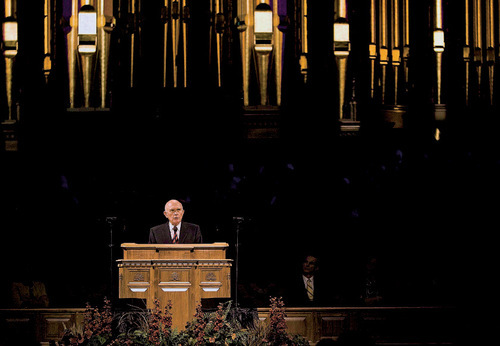This is an archived article that was published on sltrib.com in 2010, and information in the article may be outdated. It is provided only for personal research purposes and may not be reprinted.
LDS apostle Dallin H. Oaks celebrated the Constitution's 223rd birthday on Friday with a speech asserting that states have the primary power to define marriage, and a federal court ruling to the contrary would upset the proper balance of powers.
That comes a month after a federal district court overturned California's Proposition 8, through which that state's voters banned same-sex marriage. The decision is on appeal. Meanwhile, the California Supreme Court earlier had upheld Prop 8 during its state-law review.
"The power to make laws on personal relationships is one of those powers not granted to the federal government and therefore reserved to the states," said Oaks, a former Utah Supreme Court justice, during a Constitution Day speech sponsored by the University of Utah's Hinckley Institute of Politics. Oaks' speech was delivered at the Tabernacle on Temple Square, but the event was secular.
Oaks said the "dominance of state law in these personal matters" would be changed if "federal courts could decree that a state law on marriage is invalid under the U.S. Constitution."
He added, "If the decisions of federal courts can override the actions of state lawmakers on this subject, we have suffered a significant constitutional reallocation of lawmaking power from the lawmaking branch to the judicial branch and from the states to the federal government."
Oaks' comments were questioned by groups that support gay marriage, and praised by those that promote traditional marriage.
Clifford Rosky, a University of Utah law professor who is a member of the legal panel for Equality Utah, a gay rights group, disagreed with Oaks. He noted that the Supreme Court in 1967 overturned a Virginia law that had banned interracial marriage.
"That was a federal court saying that a state marriage law was invalid," so such a thing has already happened, and the Prop 8 litigation may not change a balance of power between states and the federal government, Rosky said.
Brandie Balken, executive director of Equality Utah, added, "I worry about what happens to people when they are married in one state, but move to another state that doesn't recognize their marriage.
"What happens to their marriage status? Their children's status?"
Balken said she has seen hospitals deny a same-sex spouse visitation rights and the ability to make health decisions.
"Those are the sorts of questions I have if we choose not to have a national standard for marriage," she said. "It is important to engage in this debate."
Bill Duncan, director of the Marriage Law Foundation, a national group based in Lehi that defends traditional marriage, praised Oaks' view, and said the overturn of Proposition 8, if upheld, would "mandate a national redefinition of marriage that applies to all states immediately."
He said, "I am pleased to see that discussion beginning" on the federalism issues that imposition would create "because I completely agree this is one of the most serious problems with the current Prop 8 case."
On another topic, Oaks made a call for defense of religious freedom and protection of religious minorities.
That comes at a time when Muslims especially have been targeted by some — including protests over plans to build a mosque two blocks from ground zero in New York City.
Many of the past battles over religious freedom "involved government efforts to impose upon the practices of small groups like Jehovah's Witnesses and Mormons," Oaks said. "Recent experiences suggest adding Muslims to that select category of threatened religious minorities."
Oaks added: "Unpopular minority religions are especially dependent upon a constitutional guarantee of free exercise of religion. … The importance of that guarantee should make us ever diligent to defend it."
Oaks also said that for government to function properly under the Constitution, "We must have civility in political discourse."
That is not the case now, he said.
"We currently have an excess of ugliness and contentiousness. … We have all been exposed to it, and some of us have occasionally been part of it. We all bear some responsibility for the current political polarization and the stalemates that have resulted from it. We ought to tone it down."



